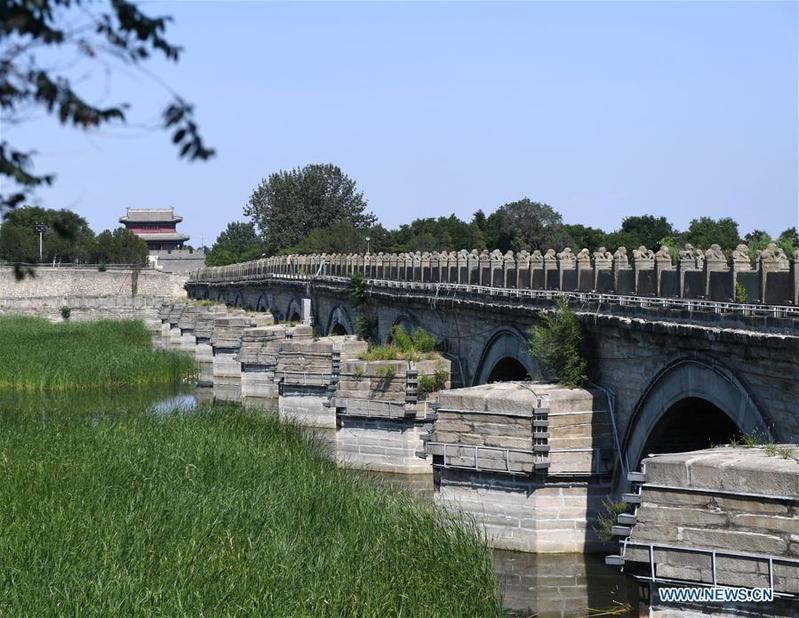 Photo taken on July 7, 2020 shows a view of the Lugou Bridge in Beijing. (PHOTO / XINHUA)
Photo taken on July 7, 2020 shows a view of the Lugou Bridge in Beijing. (PHOTO / XINHUA)
Nine decades ago, to divert public attention from a series of domestic issues caused by the Great Depression, Japan staged the Sept 18 Incident in 1931 despite the Versailles-Washington System being in place after the end of World War I to deter conflicts between states. The incident marked the beginning of Japan's large-scale invasion of China.
Speaking at a symposium last year to mark the 75th anniversary of the victory in the War of Resistance Against Japanese Aggression (1931-45) and the World Anti-Fascist War, President Xi Jinping said it was the longest war the Chinese people had against foreign aggression, which led to the Chinese people's first complete victory in the struggle for national liberation.
The world is undergoing unprecedented changes, and witnessing a new kind of competition between China and the United States. As such, China must stay positive, and strive to build a community with a shared future for mankind
The great victory was a historic turning point, signaling the emergence of China from a severe crisis and the start of the journey toward national rejuvenation, Xi said, and emphasized that the great spirit of resisting aggression that was born during the war is an invaluable source of inspiration, and will always motivate the Chinese people to overcome difficulties and obstacles and strive to realize national rejuvenation.
The Chinese people demonstrated their patriotism, national character, heroism and a strong will to win during the war, and the Communist Party of China played a vital role in this great victory.
From 1931 to 1936, the then ruling Kuomintang forces shielded themselves in fortresses, and instead of fighting the Japanese invaders, they launched campaigns to suppress the CPC army. In response to Kuomintang's encirclement policy, the Party proposed all-out resistance, campaigned for a national united front and charted the correct path to achieve success in the war and lead China to the road to development.
In 1937, the Lugou Bridge Incident, also known as the Marco Polo Bridge Incident, in Beijing, gave rise to national resistance against the Japanese invaders, with the CPC continuing to push for the formation of a united front and strengthen the Chinese people's resolution to fight.
During the war, the CPC-led army established the Soviet Area with local people in the Shaanxi-Gansu-Ningxia Border Region. The Party not only led the war against the enemies but also took part in production activities in the region.
The CPC forged a close bond with the local people, laid out the strategic guidelines for a protracted war, and charted the direction for the country's development. In the process, the CPC became a mature Marxist political party and demonstrated that it was capable of leading the revolution in China.
In particular, the Party worked with non-communist groups to establish local governments in the Soviet areas in a bid to encourage them to fight the Japanese invaders together. The CPC promoted democracy by organizing elections and establishing various autonomous organizations in these regions to ensure its initiatives covered all areas.
The spirit of resistance against foreign aggression, which was underlined by President Xi in 2014, includes patriotism that inspires people to work for the betterment of the country, national character that prompts people to make the ultimate sacrifice for the greater good, heroic valor that gives people the strength to confront foreign interventions, and an unfailing belief in victory.
Yet the meaning of the spirit of resistance needs to be expanded in the new era when China is at a critical stage of realizing national rejuvenation. During the War of Resistance Against Japanese Aggression, China was fighting against the Japanese invaders, but in the new era, China faces daunting challenges both within and outside the country.
The principal contradiction in Chinese society has evolved from one between the ever-growing material and cultural needs of the people and backward social production to that between "unbalanced and inadequate development and the people's ever-growing needs for a better life". Under such circumstances, the Party needs to instill a greater sense of patriotism, promote innovation and follow the mass line, the principle of "from the people, to the people".
The world is undergoing unprecedented changes, and witnessing a new kind of competition between China and the United States. As such, China must stay positive, and strive to build a community with a shared future for mankind.
No matter how complex the international situation is, the Party must have full confidence in its path, theory and system in order to realize the Chinese Dream of national rejuvenation.
The author is a researcher of the Institute of Japanese Studies, Chinese Academy of Social Sciences.
The views don't necessarily reflect those of China Daily.


